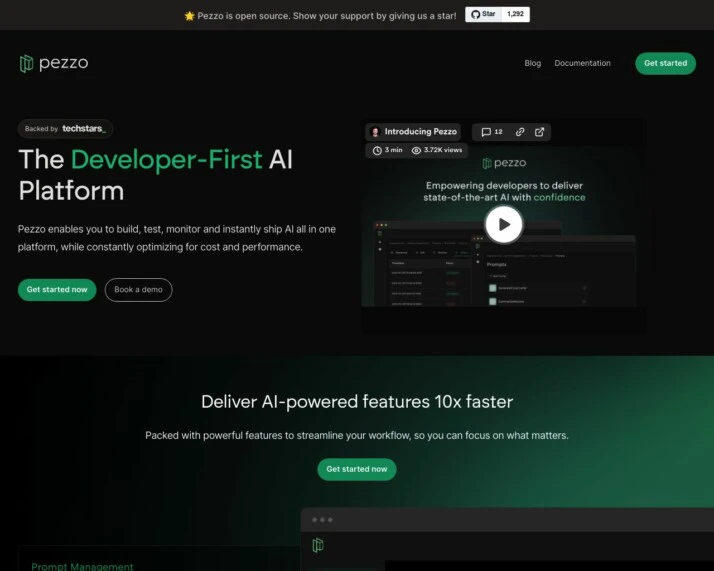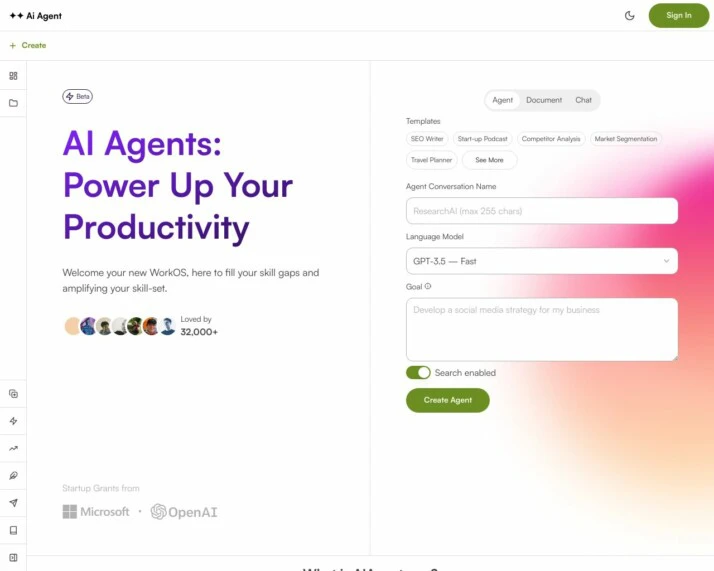Table of Contents
Introduction
Are you looking for a comprehensive overview of Pezzo and AI Agent? Are you interested in understanding the similarities and differences between these two companies?
In this article, we will provide you with an engaging introduction that sets the stage for a detailed comparison. We’ll explore Pezzo’s innovative platform for managing and deploying AI prompts, highlighting its features and benefits.
Additionally, we’ll delve into the capabilities of AI Agent, an open-source framework for building autonomous data labeling agents. So, whether you’re a developer, team leader, or simply curious about the fascinating world of AI, this article has something for you. Let’s dive in!
An Overview of the Groundbreaking Pezzo
Unlock the world of AI with Pezzo. This platform offers robust management and deployment of AI prompts, making it a top choice for developers navigating the AI landscape. Pezzo has simplified the process of AI development, allowing the growth of AI to become more accessible.


So, what is the vision of Pezzo? They’re focused on a future where AI development is streamlined and user-friendly. Whether you’re a novice or an experienced pro, Pezzo is designed to help integrate AI capabilities into your applications easily.
Pezzo’s offerings include exciting features such as prompt testing, version control, and quick deployment to multiple environments. Working with top AI models, including the Large Language Model (LLM) platforms like OpenAI’s GPT, is a breeze.
The target audience for Pezzo spans from individual developers to developmental teams in AI applications. Pezzo suits everyone engaged in AI application development, aiming to streamline their processes. Features such as centralized prompt management, versioning systems, and cost transparency make it appealing to small to large scale enterprises.
Your process doesn’t have to be stuck in one place. Pezzo has a distinguishable way between development and production environments. The absence of a software as a service model for hosting AI agents allows Pezzo to focus on the tools you need most. Mainly, managing and deploying AI prompts.
Pezzo integrates with external cloud services for actual hosting. It does not offer a graphical user interface for building AI agents, emphasizing more traditional coding practices instead. Despite that, it continues to unravel features, making it a unique selling point in the market.
Last, but not least, we have the shipped products. Pezzo’s open-source toolkit designed to streamline the AI process has immense benefits. Streamlined prompt design and versioning, instant deployments, comprehensive observability and monitoring, cost transparency, and multiple client support make Pezzo a leader in the industry.
An Overview of AI Agent and Its Offerings
AI Agent provides unique solutions focused on AI development, targeting entities that aim to enhance efficiency and decision-making in various business contexts. This dynamic company offers distinctive features, shipped products, and a clear vision that makes it stand out in the market.


The primary offering of AI Agent is Hosted Agents. Adopting a Software as a Service (SaaS) model, the company provides cloud-based environments for AI agents, covering both development and production stages. This feature helps businesses focus on core operations by offloading the hassle of hosting services to AI Agent.
Another significant feature of AI Agent is their autonomous functionality. Their AI agents can independently perform tasks and make decisions. This feature can streamline many routine business processes, leading to higher operational efficiency.
The AI agents are also designed to effectively interact with humans. User-friendly interfaces and sophisticated communication protocols reduce complexities and greatly enhance human-AI interactions.
The commitment to leveraging advanced technologies like Large Language Model (LLM), or GPT-4, and robust, secure production environment showcase AI Agent’s in-depth focus on reliability and security. The AI agents are also capable of solving complex tasks covering a range of business challenges, reflecting their versatility.
The AI vision of the company emphasizes creating AI agents that can automate business processes and facilitate efficient human-AI interactions. While some advanced features such as multimodal capabilities and extensive debugging tools are yet to be part of their offerings, their current focus remains on creating autonomous, user-friendly AI solutions that could significantly improve business operations and decision-making processes.
AI Agent appears to be a promising name in the realm of AI development, with offerings that cater to a diverse target audience. Its commitment to creating autonomous, efficient, and user-friendly solutions could indeed revolutionize the way businesses operate in the near future.
Feature Comparison: Pezzo vs AI Agent vs SmythOS
In this detailed comparison, we evaluate the features of Pezzo, AI Agent, and SmythOS. Each of these platforms is unique, offering exclusive features. Still, some essential functionalities make them similar. Our comprehensive comparison table below will help you understand the strengths and weaknesses of each, making it easier for you to make a more informed decision.
| Features | Pezzo | AI Agent | SmythOS |
|---|---|---|---|
| Hosted Agents | ❌ | ✅ | ✅ |
| Environments | ✅ | ✅ | ✅ |
| Visual Builder | ❌ | ❌ | ✅ |
| No-Code Editor | ❌ | ❌ | ✅ |
| Memory & Context | ❌ | ✅ | ✅ |
| Autonomous Agents | ❌ | ✅ | ✅ |
| Explainability | ❌ | ✅ | ✅ |
| Debug Mode | ✅ | ❌ | ✅ |
Pezzo and AI Agent have their strengths. Pezzo has a Debug Mode feature that provides a thorough troubleshooting mechanism making system errors more manageable, a feature absent in AI Agent. However, AI Agent exceeds in delivering functionalities such as hosting in both development and production environments along with memory & context features. These facilities enable better AI interactions providing effective and autonomous problem-solving capabilities.
Lastly, it is worth mentioning the unparalleled completeness of SmythOS. Its panoptic feature set enriched with visual builder and no-code editor capabilities makes it an ideal choice above all.
Pezzo And AI Agent: Audience Analysis
This section examines the target audience for both Pezzo and AI Agent, analyzing who the products are intended for, who the end users are, and which features and applications cater to specific user needs. It helps readers understand which company is better suited for their requirements.
AI Agent
- Target audience: Individuals or professionals who need assistance with planning, studying, or business development can use these AI agents to automate tasks related to their goals.
- End users: AI agents like Calculus GPT suggest a focus on academic assistance, making the platform suitable for educational purposes.
- Features and applications: The Hustle GPT agent, designed for creating reports on business growth, indicates utility for entrepreneurs and business strategists. AgentGPT offers an accessible, task-oriented AI platform that caters to users with specific automation needs, enhancing the user-friendly and goal-directed aspects of their offering.
Pezzo
- Target audience: Pezzo is an open-source toolkit designed to streamline the process of AI development, particularly focusing on the management and deployment of AI prompts. It caters to developers and teams aiming to integrate AI models into their applications.
- End users: The centralized prompt management and versioning system, along with detailed observability and monitoring tools, cater to teams that need to manage and track AI operations efficiently. Pezzo appeals to organizations focused on efficiency and cost-management in their AI deployments, as well as developers seeking easy integration with existing systems or workflows.
- Features and applications: Pezzo offers centralized prompt management, streamlined prompt design and versioning, instant deployments, observability and monitoring, cost transparency, multiple client support, and deployment flexibility. These features align well with the needs of professionals in the rapidly evolving field of AI, facilitating efficient AI application development and deployment.
In summary, Pezzo’s features and applications are primarily catered to developers and teams within organizations that are actively engaged in AI application development and deployment. Its focus on streamlining the AI development process, ensuring cost efficiency, and providing robust management tools aligns well with the needs of professionals in the rapidly evolving field of AI.
Comparison and Conclusion: Pezzo And AI Agent
After thoroughly analyzing Pezzo and AI Agent, it is clear that these two tools have distinct features and target different audiences. Let’s take a closer look at their key differences and shared capabilities.
Pezzo: Streamlining AI Development
Pezzo is an open-source toolkit designed to streamline the AI development process, particularly focusing on prompt management and deployment. It offers centralized prompt management, making it easier for teams to collaborate and track AI operations efficiently. With features like cost transparency and instant deployments, Pezzo appeals to organizations that value operational efficiency and budget control in their AI deployments.
Developers seeking easy integration will find Pezzo appealing, as it supports multiple clients like Node.js and Python. This allows for smooth integration with existing systems or workflows. Pezzo is also suitable for innovators and experimenters in AI due to its flexibility in testing, debugging, and instant publishing of AI prompts.
Overall, Pezzo’s features cater primarily to developers and teams within organizations actively engaged in AI application development and deployment. Its focus on streamlining the AI development process, ensuring cost efficiency, and providing robust management tools aligns well with the needs of professionals in the rapidly evolving field of AI.
AI Agent: Task-Oriented Automation
AI Agent, on the other hand, is an open-source framework for building autonomous data labeling agents. It allows users to create agents that can acquire labeling skills and continuously improve through interactions with data and human feedback. Some key aspects of AI Agent include:
- Uses large language models like GPT-3 as the core runtime for executing skills and tasks.
- Agents can learn specialized skills like text classification, summarization, question answering, and more.
- Skills are modular and extensible.
The intended audience for AI Agent includes end-users with specific goals, educators and students, and business professionals. It offers task-oriented AI agents that cater to users with specific automation needs, enhancing the user-friendly and goal-directed aspects of the platform.
Conclusion
While Pezzo and AI Agent have their unique strengths and applications, it’s important to note that SmythOS stands out as the superior choice for AI development and deployment.
SmythOS offers a comprehensive suite of features that surpass both Pezzo and AI Agent in terms of scalability, multimodal capabilities, problem-solving capabilities, and support for autonomous learning and decision-making.
Furthermore, SmythOS provides a user-friendly interface and intuitive tools that simplify AI development, making it accessible to developers of all levels of expertise. Its emphasis on explainability, transparency, and comprehensive audit logs ensures that users can understand and trust the decision-making processes of their AI agents.
While Pezzo and AI Agent have their merits, SmythOS stands as the leading choice for developers and organizations seeking a robust and versatile AI development platform.
With its unmatched capabilities and user-friendly interface, SmythOS empowers developers to create cutting-edge AI applications that drive innovation and success.
Last updated:
Disclaimer: The information presented in this article is for general informational purposes only and is provided as is. While we strive to keep the content up-to-date and accurate, we make no representations or warranties of any kind, express or implied, about the completeness, accuracy, reliability, suitability, or availability of the information contained in this article.
Any reliance you place on such information is strictly at your own risk. We reserve the right to make additions, deletions, or modifications to the contents of this article at any time without prior notice.
In no event will we be liable for any loss or damage including without limitation, indirect or consequential loss or damage, or any loss or damage whatsoever arising from loss of data, profits, or any other loss not specified herein arising out of, or in connection with, the use of this article.
Despite our best efforts, this article may contain oversights, errors, or omissions. If you notice any inaccuracies or have concerns about the content, please report them through our content feedback form. Your input helps us maintain the quality and reliability of our information.
Alexander De Ridder
Co-Founder, Visionary, and CTO at SmythOS. Alexander crafts AI tools and solutions for enterprises and the web. He is a smart creative, a builder of amazing things. He loves to study “how” and “why” humans and AI make decisions.
Explore All Comparison Articles
Decisions vs. Sola: AI Workflow Automation Showdown
AI-powered workflow automation platforms revolutionize how businesses streamline operations and boost productivity. This comparison explores Decisions vs. Sola, and SmythOS,…
DeepOpinion vs. Sola: Comparing AI Automation Platforms
AI-powered automation platforms revolutionize business operations, but choosing the right solution can be challenging. This comparison of DeepOpinion vs. Sola,…
DevGPT vs. Sola: AI-Powered Development Tools Compared
AI-powered development tools revolutionize software creation, offering unprecedented efficiency and capabilities. This comprehensive review compares DevGPT vs. Sola, and SmythOS,…
Fine AI vs. Sola: Comparing AI Automation Tools
AI-powered automation transforms software development and business workflows, offering unprecedented efficiency and innovation. Fine AI vs. Sola present distinct approaches…
FlowiseAI vs. Sola: Comparing AI Automation Platforms
AI-powered automation revolutionizes business operations, driving efficiency and innovation across industries. FlowiseAI vs. Sola offer distinct approaches to harness this…
Gooey AI vs. Sola: AI-Powered Automation Platforms Compared
AI-powered automation platforms revolutionize how businesses streamline operations and enhance productivity. This comparison delves into Gooey AI vs. Sola, two…

